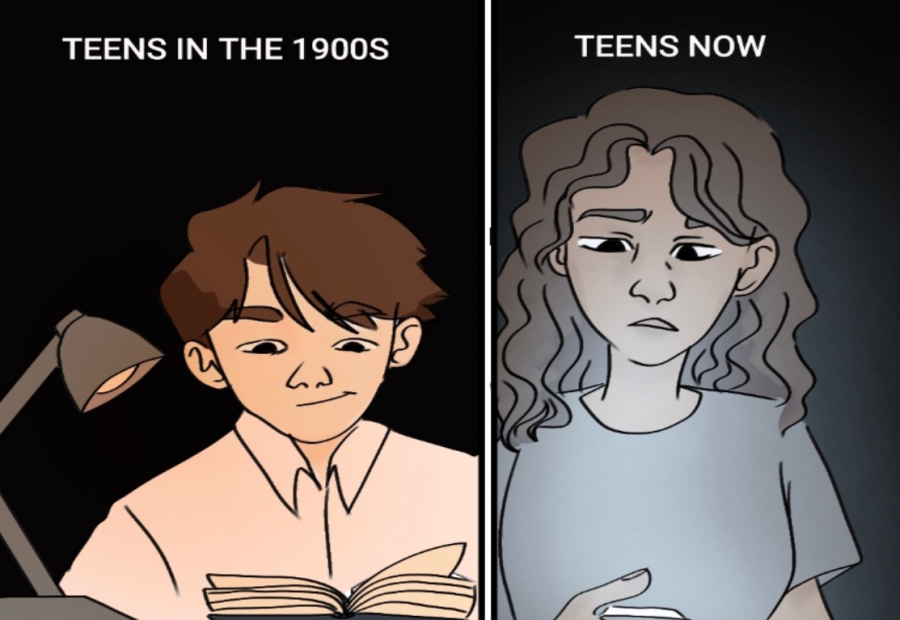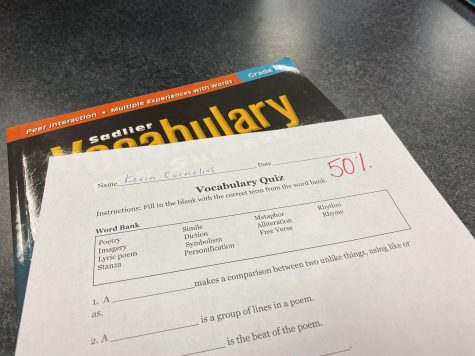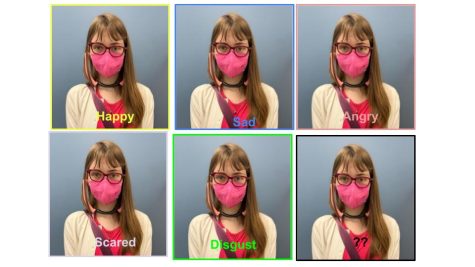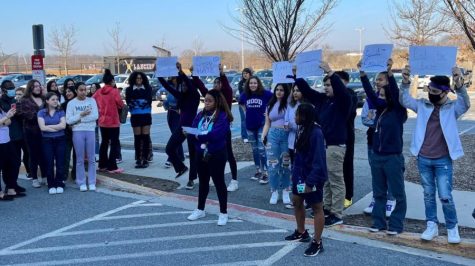How do we cure the reading allergy?
On the left, a teenager happily reading a book. On the right, a teenager expressionless staring at the screen of her smart phone.
November 6, 2019
Almost everywhere you go, the eyes of children, teens, and even adults are glued to the screens of their smartphones. Nowadays, cellphones are often used as a form of entertainment, where is reading daily for pure enjoyment in a teen’s life?
Who takes time to read a book? An American Time Use study from 2017 shows that leisure reading has gone down 19% since 2003. Down from the average of 23 minutes per day, the average person now reads 17 minutes a day.
Why is it such a big deal that teens aren’t reading? For starters, an addiction to the smartphone and/or video games is obviously not healthy. Not only can it strain the eyes, it can also add/create anxiety to an already stressful life. A Pew Research Center study proves that out of the 95% of teens who have smartphones, 45% say that they are online constantly. To top that, social media networks give teens the opportunity to compare themselves to peers and/or celebrities. If not purposeful, this is often subconscious and can have serious harmful effects to our confidence.
Book recommendation relating to anxiety: Some Kind of Happiness, by Claire Legend. Finley Hart’s only escape from her arguing parents and her ‘blue days’ as she calls them is her imaginary world; Everwood. When Finley’s parents (who pretend they aren’t having problems) send her to her grandmother’s house (who she has never met) she discovers that the Everwood she writes about is real and right in her grandmother’s backyard. The only problem is that Everwood is under attack. In order to save the Everwood, Finley must save herself first.
Reading novels on the other hand allows us to escape to another reality and experience a completely new world filled with limitless ideas and stunning characters. It increases our empathy, for we get to see the eyes of another person and see how they maneuver through the various conflicts and journeys thrown at them.
Reading lets us expand our thoughts to the point that we can be in a completely new universe without leaving the comfort of our own home. Unlike video games, books let us see the world in a way that we want to see it. We create our own visuals in our minds. We can experience virtually that which we may never dreamed would be possible.
Escaping Reality: The Harry Potter series, by J.K. Rowling. If you haven’t already read this series, you’re missing out. Children all over the world fell in love with Hogwarts as they did with quidditch. Rowling’s writing beautifully entrances not only children, but adults, too.
Senior Gabby North said, “A book that I really connected with was Looking for Alaska. When I read the scenes where Alaska, Pudge, Takumi, The Colonel, and Lara were swimming at the swimming hole in the summer, I felt like I was there. The descriptions used completely pulled me into the book. Some nights I couldn’t put the book down.”
The more that you read, the more you will know. The more that you know, the more places you will go — Dr. Seuss
Media specialist Marsha Thompson said, “Reading opens up a whole world to us. It allows us to explore and develop our thoughts. It presents new and different perspectives. Reading can provide any experience you want or need, from an escape to finding lifesaving information.”
Studies show that reading has a calming effect on the mind, ultimately decreasing anxiety. It may even be the best solution to stress. Just reading six minutes a day can calm your mind and body. Teens often complain about how stressed and tired they are. This can make any avid reader wonder if their stress could go down if they reached for a book instead of their smartphones.
Calming books: A Lite Too Bright, by Samuel Miller. This coming-of-age novel is beautifully written. This novel follows Arthur Louis Pullman the Third who lives in his grandfather’s shadow. His grandfather, Arthur Louis Pullman was a famous author. Days before his death he went missing without a clear explanation for where he went and what he did. Arthur is determined to figure out the mystery of his grandfather. Arthur sets off on a journey to figure what exactly happened.
Sophomore Caroline Hobson enjoys reading. She said, “Reading lets me get away from the real world for a little while. It allows me to get away from social media and the pressures of school and it allows me to unwind.”
I, too, love to read and I was extremely curious to see why my peers don’t enjoy reading as much as I do. I know it can be difficult to find the right book and I know reading takes a certain amount of focus, but to me, no reason could excuse the absence of reading from a teen’s life.
Freshman Daryn Rowse, said “I have a lot of things I’d rather do, like play video games and sports. I’m a very energetic person, and staying in one spot for a long period at a time is difficult for me.”
I believe that there is a certain stigma around reading that may keep some teens from reading novels. For instance, a teen may be forced to read a book for their English class, conclusively creating a bad experience if the book was not particularly enjoyable. Now the teen will associate reading with that one bad experience, ultimately concluding reading is tiresome. Going further, when anyone is forced to do something, that can take away the amusement of that particular activity. No teen enjoys their homework, so why would they enjoy reading?
“People tend to give up on reading after just one ‘bad’ experience but they don’t do the same thing with other forms of entertainment like movies,” said Ms. Marsha Thompson. “I’m not sure why this is but I would encourage everyone to stop by the Learning Commons and see what we have to offer. Part of my job is making sure there are materials for everyone. Come on in and let me know how I’m doing.”
I hope that I, and other readers, can work together to demolish the “reputation” that reading holds and teach others the great aspects of reading all the while ending the high usage of social media.














